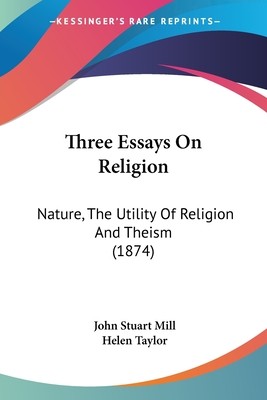
- We will send in 10–14 business days.
- Author: John Stuart Mill
- Publisher: Kessinger Publishing
- ISBN-10: 0548771561
- ISBN-13: 9780548771563
- Format: 15.2 x 22.9 x 1.6 cm, minkšti viršeliai
- Language: English
- SAVE -10% with code: EXTRA
Reviews
Description
In these three essays, "Nature, " "The Utility of Religion, " and "Theism, " published between 1850 and 1870, English social and political philosopher John Stuart Mill (1806-1873) gives his most sustained analysis of religious belief. Though not prepared to abandon the idea of an overall design in nature, Mill nonetheless argues that its violence and capriciousness militate against moral ends in nature's workings. Moreover, any designer of such a world as we experience it cannot be all powerful and all good for nature is "too clumsily made and capriciously governed." However, since humankind, by and large, cannot, it seems, be deprived of religion, Mill espouses what he calls a "religion of humanity, " whose concepts of justice, morality, and altruism are based on classical models and on the New Testament Sermon on the Mount rather than on the vindictive God of the Old Testament and the world-hating doctrines of St. Paul.
EXTRA 10 % discount with code: EXTRA
The promotion ends in 22d.11:18:16
The discount code is valid when purchasing from 10 €. Discounts do not stack.
- Author: John Stuart Mill
- Publisher: Kessinger Publishing
- ISBN-10: 0548771561
- ISBN-13: 9780548771563
- Format: 15.2 x 22.9 x 1.6 cm, minkšti viršeliai
- Language: English English
In these three essays, "Nature, " "The Utility of Religion, " and "Theism, " published between 1850 and 1870, English social and political philosopher John Stuart Mill (1806-1873) gives his most sustained analysis of religious belief. Though not prepared to abandon the idea of an overall design in nature, Mill nonetheless argues that its violence and capriciousness militate against moral ends in nature's workings. Moreover, any designer of such a world as we experience it cannot be all powerful and all good for nature is "too clumsily made and capriciously governed." However, since humankind, by and large, cannot, it seems, be deprived of religion, Mill espouses what he calls a "religion of humanity, " whose concepts of justice, morality, and altruism are based on classical models and on the New Testament Sermon on the Mount rather than on the vindictive God of the Old Testament and the world-hating doctrines of St. Paul.


Reviews